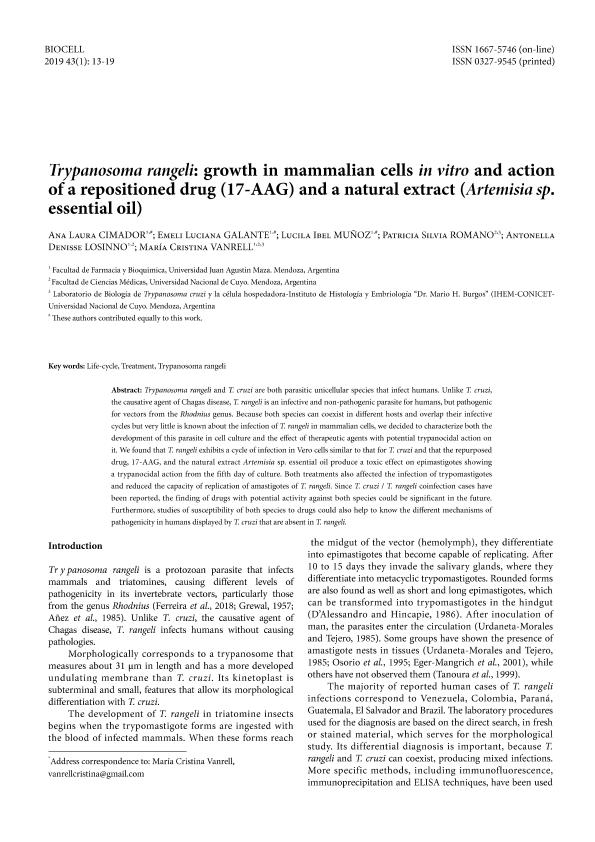Artículo
Trypanosoma rangeli: growth in mammalian cells in vitro and action of a repositioned drug (17-AAG) and a natural extract (Artemisia sp. essential oil)
Cimador, Ana Laura; Galante, Emeli Luciana; Muñoz, Lucila Ibel; Romano, Patricia Silvia ; Losinno, Antonella Denise
; Losinno, Antonella Denise ; Vanrell, Maria Cristina
; Vanrell, Maria Cristina
 ; Losinno, Antonella Denise
; Losinno, Antonella Denise ; Vanrell, Maria Cristina
; Vanrell, Maria Cristina
Fecha de publicación:
10/2019
Editorial:
Instituto de Histología y Embriología
Revista:
Biocell
ISSN:
0327-9545
e-ISSN:
1667-5746
Idioma:
Inglés
Tipo de recurso:
Artículo publicado
Clasificación temática:
Resumen
Trypanosoma rangeli and T. cruzi are both parasitic unicellular species that infect humans. Unlike T. cruzi, the causative agent of Chagas disease, T. rangeli is an infective and non-pathogenic parasite for humans, but pathogenic for vectors from the Rhodnius genus. Because both species can coexist in different hosts and overlap their infective cycles but very little is known about the infection of T. rangeli in mammalian cells, we decided to characterize both the development of this parasite in cell culture and the effect of therapeutic agents with potential trypanocidal action on it. We found that T. rangeli exhibits a cycle of infection in Vero cells similar to that for T. cruzi and that the repurposed drug, 17-AAG, and the natural extract Artemisia sp. essential oil produce a toxic effect on epimastigotes showing a trypanocidal action from the fifth day of culture. Both treatments also affected the infection of trypomastigotes and reduced the capacity of replication of amastigotes of T. rangeli. Since T. cruzi / T. rangeli coinfection cases have been reported, the finding of drugs with potential activity against both species could be significant in the future. Furthermore, studies of susceptibility of both species to drugs could also help to know the different mechanisms of pathogenicity in humans displayed by T. cruzi that are absent in T. rangeli.
Palabras clave:
Trypanosoma rangelli
,
treatment
Archivos asociados
Licencia
Identificadores
Colecciones
Articulos(IHEM)
Articulos de INST. HISTOLOGIA Y EMBRIOLOGIA DE MEND DR.M.BURGOS
Articulos de INST. HISTOLOGIA Y EMBRIOLOGIA DE MEND DR.M.BURGOS
Citación
Cimador, Ana Laura; Galante, Emeli Luciana; Muñoz, Lucila Ibel; Romano, Patricia Silvia; Losinno, Antonella Denise; et al.; Trypanosoma rangeli: growth in mammalian cells in vitro and action of a repositioned drug (17-AAG) and a natural extract (Artemisia sp. essential oil); Instituto de Histología y Embriología; Biocell; 43; 1; 10-2019; 13-19
Compartir
Altmétricas



